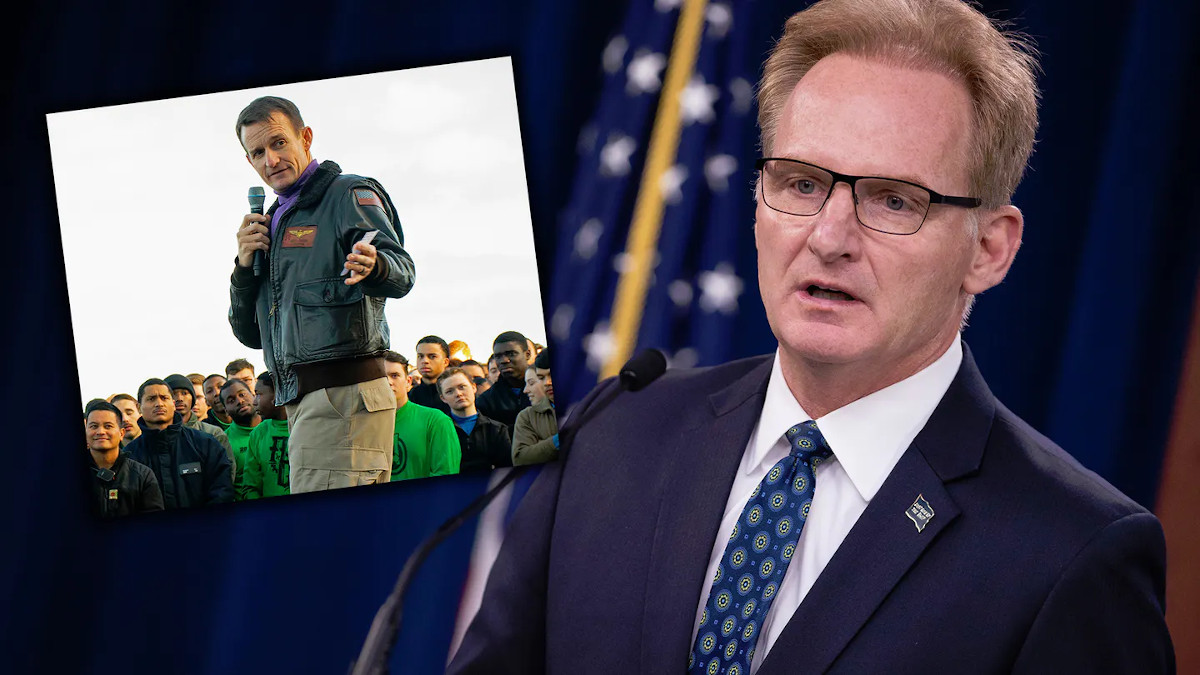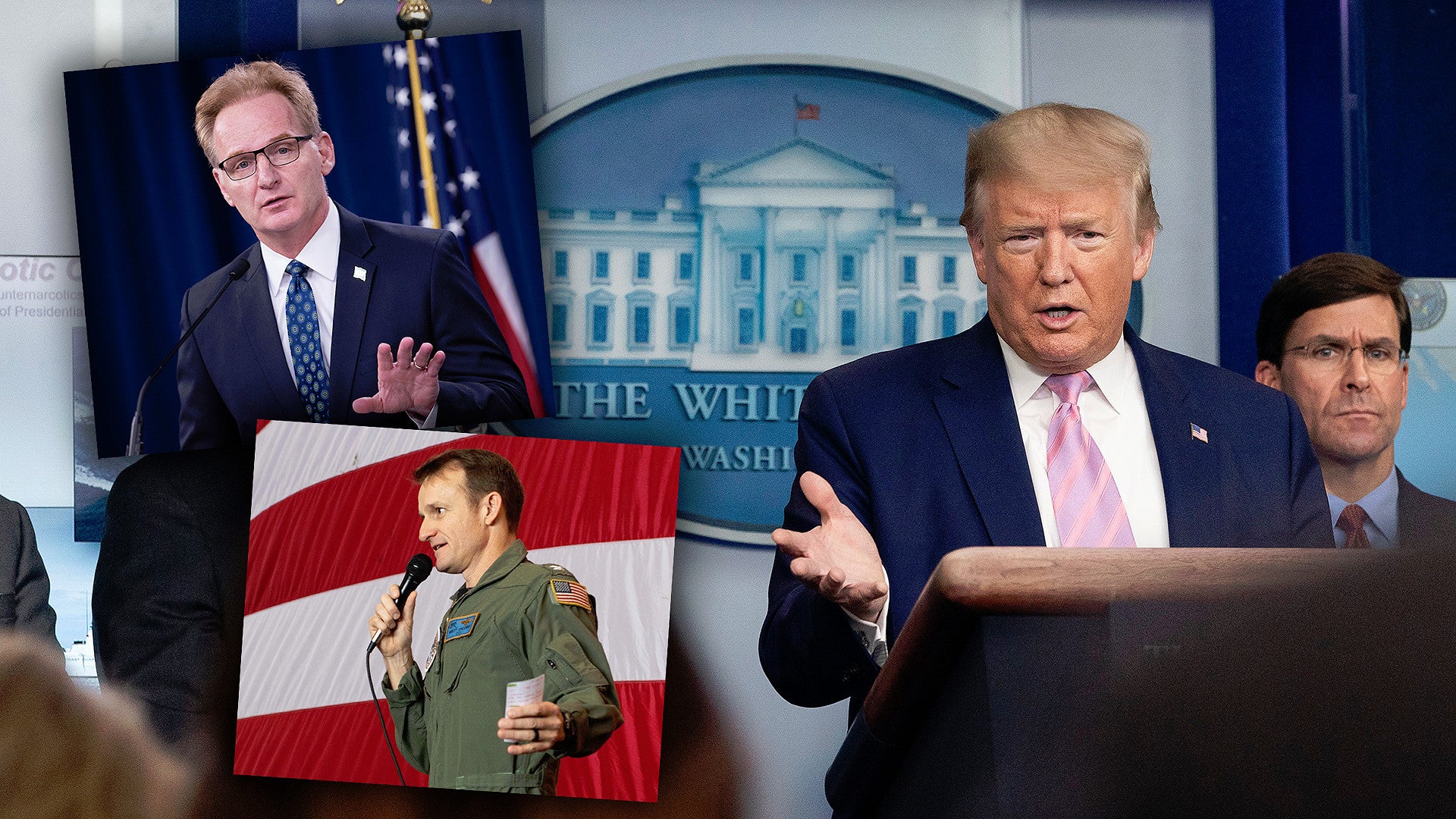President Donald Trump now says he will look into the circumstances surrounding the firing of U.S. Navy Captain Brett Crozier, saying he doesn’t believe the officer’s career should be at risk for “having a bad day.” The service booted Crozier from his job as commanding officer of the Nimitz class aircraft carrier USS Theodore Roosevelt, which is presently experiencing a major outbreak of the COVID-19 novel coronavirus, after he sent an impassioned letter asking to get the bulk of his crew off the ship to stem the disease’s spread. Acting Secretary of the Navy Thomas Modly has come under increasing fire for that decision after a transcript and audio recording of a speech he gave on the carrier this weekend, in which he disparaged Crozier, the media, and the crew, emerged earlier today.
The Navy relieved Crozier from his command on Apr. 2, two days after he sent the letter, which you can read about in more detail in this past War Zone piece. The service’s official reason for doing so is that senior leaders lost faith in the captain’s ability to command because of his poor judgment in disseminating the letter to multiple recipients via unclassified channels, which Modley claims would have made it likely that it would leak to the press. Modly also says the letter contained details about Theodore Roosevelt’s readiness and the situation on board the ship that could have been of use to America’s adversaries, primarily China.
“I haven’t heard it [Modly’s speech] exactly, I haven’t heard – I heard they had a statement that was made and if that were the statement it’s a strong statement,” Trump said said at the daily press conference regarding the COVID-19 pandemic. “I must tell you I’ve heard very good things about the gentleman, both gentlemen, by the way, I will say this, about both gentlemen, and I may look into it only from the standpoint that something should be resolved, ’cause I’m hearing good things about both people.”
“If two good people and they’re arguing and I’m good, believe it or not, at settling arguments. I’m good at settling these arguments. So, I may look into it in great detail and I’ll be able to figure it out very fast,” Trump continued. “His [Captain Crozier’s] career prior to that was very good, so I’m going to get involved and see exactly what’s going on, because I don’t want to destroy somebody for having a bad day.”

Crozier saw an unprecedented outpouring of support from his crew after being relieved from command. The captain has also received accolades from numerous politicians and retired military officers for prioritizing the welfare of his crew.
Trump had previously been especially critical of Crozier and his letter, siding with Modly’s decision to fire the captain. The President’s position now seems to be evolving in the face of growing outrage surrounding the Acting Secretary of the Navy’s speech onboard Theodore Roosevelt over the weekend. You can read a full transcript of and listen to an audio recording of Modly’s remarks here.
However, Trump remained critical of Crozier’s decision to send the letter. “Letters should not have been sent to many people, unclassified, that was a mistake,” the President said.
“It’s a mistake that shouldn’t have been made, because it’s unfair to the families of the people on the ship because they get nervous and it shows weakness and there’s nothing weak about us now,” he added. “We don’t want to have letter-writing campaigns where the fake news finds a letter or gets a leak.”

This, in some ways, reflects Modly’s remarks on the Theodore Roosevelt. Trump called the parts of the speech he had seen or heard, or heard about, “rough,” as well as “strong.”
“It was betrayal [what Crozier did]. And I can tell you one other thing: because he did that he put it in the public’s forum and it’s now become a big controversy in Washington. D.C. and across the country. About a martyr CO [commanding officer] who wasn’t getting the help he needed therefore had to go through the Chain of Command, a chain of command which includes the media,” Modly had told the carrier’s crew over the weekend. “The media has an agenda and the agenda that they have depends on which side of the political aisle they sit and I’m sorry that’s the way the country is now but it’s the truth and so they use it to divide us and use it to embarrass the Navy. They use it to embarrass you.”
“I understand you love the guy [Captain Crozier],” the Acting Secretary of the Navy had added. “It’s good that you love him. But you’re not required to love him.”
On Apr. 5, Modly had also told The Washington Post’s David Ignatius that he had specifically made his decision to fire Crozier, and do so quickly, at least in part, to try to ensure that President Donald Trump would not insert himself into the process. Trump was a driving force in the ouster of Modly’s immediate predecessor, Richard Spencer, last year over the treatment of controversial SEAL Eddie Gallagher, who the Navy had acquitted of war crimes and who the President had pardoned of a remaining charge of “wrongfully pos[ing] for an unofficial picture with a human casualty.”
“I didn’t want that to happen again,” Modly explained to Ignatius. “I didn’t want to get into a decision where the president would feel that he had to intervene because the Navy couldn’t be decisive… If I were president, and I saw a commanding officer of a ship exercising such poor judgment, I would be asking why the leadership of the Navy wasn’t taking action itself.”
A preliminary Navy investigation into Crozier’s actions and the “command climate” across units assigned to its Pacific Fleet was supposed to go to the Chief of Naval Operations, Admiral Mike Gilday, today, but that review has gotten delayed. Gilday has now approved an extension.
“This extension will allow additional time to gather facts and refine the inquiry’s recommendations,” the Navy said in a statement to USNI News. “The inquiry remains in progress and is expected to be completed soon. It will take additional time for the inquiry’s recommendations to be reviewed and endorsed by Adm. Gilday.”
In the meantime, it looks increasingly like Trump is set to get more deeply involved in the Navy’s latest debacle.
UPDATE: 8:05pm EST:
Modly has now also issued a rebuttal defending his decision to fire Captain Crozier in response to an op-ed that Tweed Roosevelt, the great-grandson of President Theodore Roosevelt, the Theodore Roosevelt‘s namesake, had published in The New York Times on Apr. 3. The Acting Secretary of the Navy’s response is as follows:
“I have the utmost respect for Mr. Roosevelt and his family’s immense heritage of service to the nation. In the case of Captain Crozier, however, he is wrong. I suspect he has no other motive than to defend a courageous man, a man in the arena, but he simply does not have access to the relevant facts that led to the captain’s dismissal.”
“Capt. Crozier’s emotional letter on official Navy letterhead, addressed to no one in particular, was attached to an email which he distributed broadly to multiple addressees. It began “My Fellow Naval Aviators.” It included, and intentionally excluded, various people from his direct chain of command.”
“In the body of the email to which his letter was attached Captain Crozier wrote, “I fully realize that I bear responsibility for not demanding more decisive action the moment we pulled in (to Guam), but right now my only priority is the continued well-being of the crew and embarked staff.” While this may have been his self-assessment, I know that no one in his chain of command, up to and including me, who felt that Captain Crozier bore any responsibility for not demanding more decisive action at that time.”
“The facts are that Capt. Crozier’s direct chain of command, up to the Commander of the U.S. Pacific Fleet, had been communication with him well before (and after) he sent the email. So had my office. I asked my Chief of Staff to call him just after the ship pulled into Guam. He did so twice, and Capt. Crozier expressed no alarm to him at all. Bottom line, the public disclosure of Capt. Crozier’s letter had no impact on the flow of support to the ship. None. The crew of the ship was already being tested as rapidly as possible, isolated as necessary, and moved off the ship to quarantine. That was all happening to the greatest extent possible while still providing for the safety of the ship and all those still aboard.”
“Capt. Crozier did tell us that he was impatient with the pace of moving Sailors off the ship. We were ALL impatient with the pace. Securing 4,000 individual rooms suitable for isolation on Guam in the middle of a pandemic-forced shutdown is not a simple task. That being said, in less than a week, thanks in large part to the Government of Guam and the support of the rest of the Pacific Fleet, we have secured nearly 3,700. That plan was in action well prior to Capt. Crozier writing his letter, and it continues to be executed today.”
“What the public release of his letter did do, however, was unnecessarily create a public panic, when what was called for was calm. In my view, this is one of the main areas where Captain Crozier “bears responsibility.” It was his lapse of judgment in a moment of adversity that led to my loss of confidence in him.”
“I don’t doubt Captain Crozier’s love for his crew. But in my view, he did serious harm to his Sailors and the rest of our Navy when he created an atmosphere of crisis, while it was his primary duty to be a steady hand on a stormy sea. He did not send his dire warning on classified networks, or place any markings to suggest the information was classified, sensitive, or for official use only. While this may sound mundane to the average citizen, it is unacceptable behavior for the commanding officer of a nuclear powered aircraft carrier, and it should never be tolerated. As a civilian leader responsible to the American public for their safety and security, as well as that of every Sailor and Marine serving and standing the watch, I will not.”
“Sensitive information about the material condition of our biggest and most powerful warship made its way out into the public arena, in the hands of our adversaries. So did statements about political decisions outside the purview of the military. It was my determination that the Navy could not afford to wait to see if this lapse of judgement was just an aberration, or even the Captain’s new normal in the midst of a challenge. The stakes of our national security are simply much too high for that.”
“After all, Mr. Roosevelt, Captain Crozier was the Commanding Officer of the USS Theodore Roosevelt, and I am relatively certain your great grandfather would have demanded much more under pressure. I certainly do, and we all must.”
UPDATE: 9:15pm EST:
The Navy has issued a statement from Acting Secretary of the Navy Modly apologizing for his comments to the crew of the Theodore Roosevelt and stating clearly that “I do not think Captain Brett Crozier is naïve nor stupid.” This comes hours after Modly had said categorically that he stood by his remarks.
An internal Navy public affairs guidance instructing any sailor that had recorded Modly’s remarks and posted them online to take them down immediately has also leaked out to the press. It also advises against “bashing a senior leader online.”
Contact the author: joe@thedrive.com
